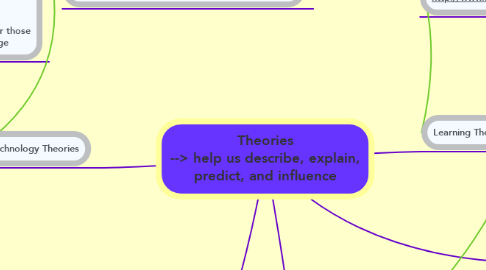Theories --> help us describe, explain, predict, and influence
by Felicity Lof

1. A Philosophy in Teachnology is one whereby technology and pedagogy are thoughfully integrated into the classroom to promote well-balanced, dynamic learning
1.1. Emphasis on: collaboration, discovery, cultural awarness, having a voice, and writing...all facilitated through technology
1.2. Supports both learner's and educator's in the educational journey
1.3. Educators Role: Develop a skill set allowing for connective learning made possible by various technology tools
2. Social Construction of Technology (SCOT) Premise: Society influences technology - technology is ingrained in a social context Contributing theorists: Wiebe Bijker, Trevor Pinch Criticisms: - the effectiveness of technologies in a broad sense is not addressed - only addresses those that interact with technologies but have no explanation for those that don’t and are still affected by change
3. Cognitive Load Premise: - how children perceive and mentally represent the world, influences their learning and overall mental processes - child is an active learner Contributing theorists: Jean Piaget, Arnold Gesell, Robert Gagne Educator’s Role: - assist children in learning cognitive skills such as memorization and problem solving skills - motivate the learner - if a child is enduring challenges, assess where the problem is (memorizing, acquiring knowledge, output of knowledge), then decide the intervention Criticisms: - underestimates role of biological maturation factors - distinct stages of learning may actually be more gradual - learning may be viewed as only mechanical
4. Technology Theories
4.1. Media Ecology Premise: Technology influences society - media has a large impact on humans and interactions - technology and media are an environment, not an organization or object Contributing theorists: Marshall McLuhan, Neil Postman Criticisms: - an emphasis on mediums, without involving communication could be flawed - lack of scientific evidence to the claims
5. TPACK Framework
5.1. The theory is based upon knowledge in Technology, Pedagogy, and Content. TK --> Technology-based learning environment PK --> an effective teaching theory, focuses on how children learn CK --> knowledge of the material being taught TPK --> how technology can enhance the teaching methodology TCK --> technologies can provide for novel content PCK --> making learning easy through efficient means of teaching TPCK --> an awareness of all three domains and how they are interrelated
6. Constructivism Premise: A transactional model whereby learning and development is shaped by environmental contexts and what active transactions a child endures - learning is an active, social process Contributing theorists: Lev Vygotsky, Maria Montessori Educator’s Role: - Facilitate the child to learn on his own accord - provide a learning environment that stimulates the child Criticisms: - considering all children’s age and learning abilities in the classroom environment can be difficult - there is a lack of empirical evidence to support the theory
7. Connectivism Premise: - connections between ideas, fields, and experiences is key to learning - the opinions of many are important in obtaining knowledge - the mind is a network, distributing knowledge throughout Contributing theorists: George Siemens, Stephen Downes Educator’s Role: - allow for networking and the connection between ideas to be made - “create learning ecologies, shape communities, and release learners into the environment” (Siemens, 2006) Criticisms: - it may not be really be a new, original theory Siemens, G. (2006). Connectivism: learning and knowledge today. http://www.mmiweb.org.uk/learningandnewtech/downloads/Siemens_2006.pdf
8. Learning Theories


